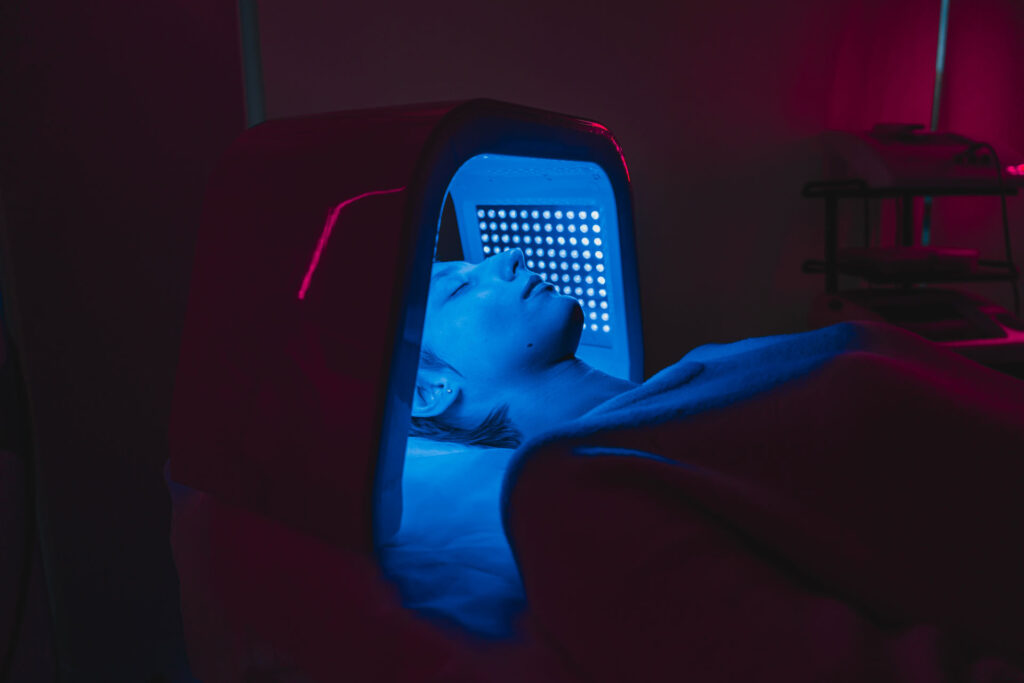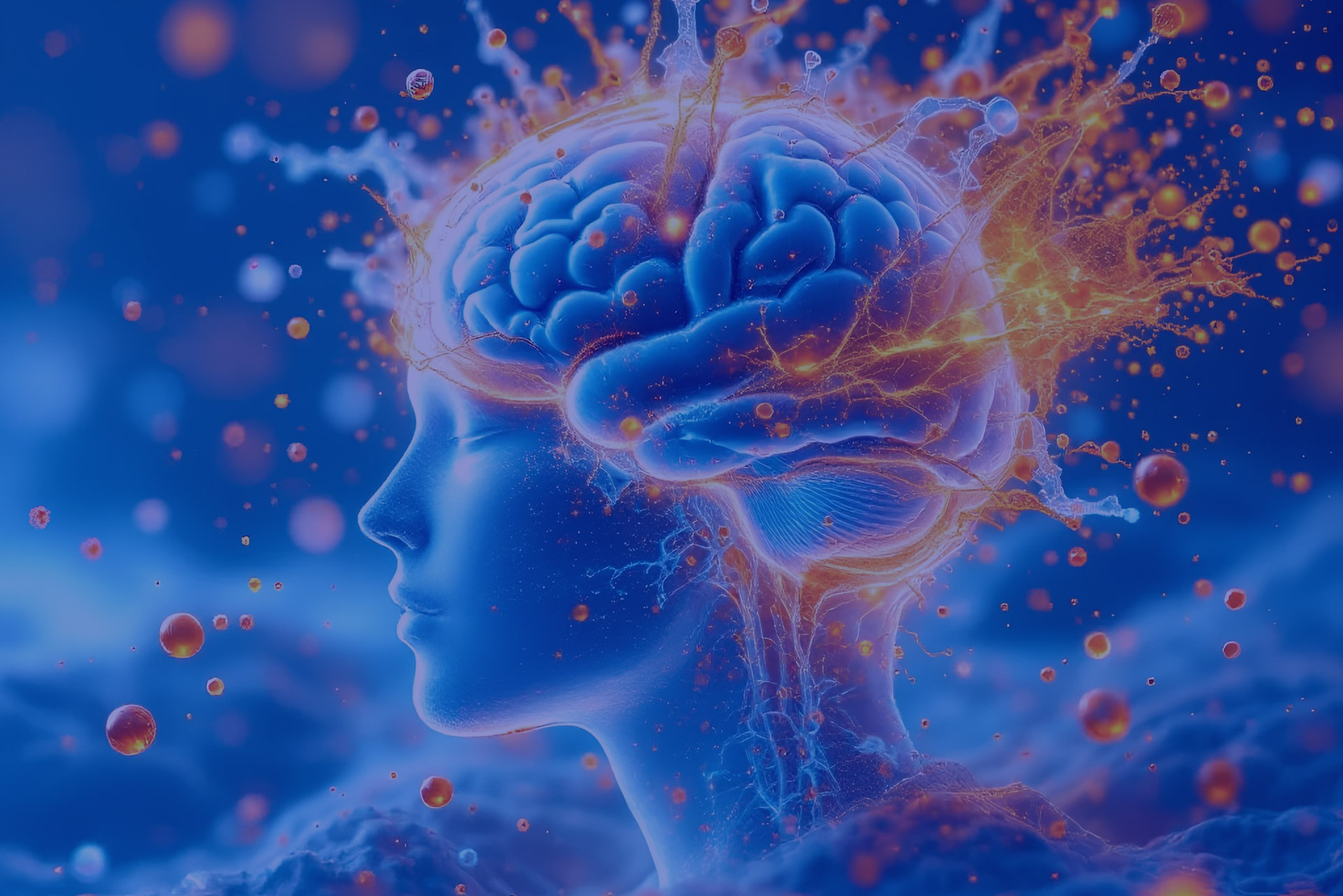Introduction
Understanding the connection between brain fog and sleep can empower you to take back your mental and emotional health with simple strategies that anyone can try.
Have you experienced that frustrating feeling of being unable to think clearly or focus on tasks? You’re likely experiencing brain fog. Whether you’re a successful professional managing a demanding career, a creative juggling multiple projects, or a Mom with a hectic schedule raising the next generation of super-humans, the impact of brain fog can be disheartening and disruptive.
The good news is that one of the keys to alleviating brain fog is simply to get better sleep. Quality sleep not only rejuvenates our bodies but also plays a crucial role in cognitive function, emotional balance, and overall health. When we prioritize restorative sleep, we unlock the potential for clearer thinking, enhanced creativity, and a renewed sense of vitality.
Read on to learn about the intricate connection between brain fog amd sleep. We’ll investigate the science of what happens in our brains during sleep, and we give you some powerful holistic strategies rooted in both functional medicine and traditional Chinese medicine. If you’ve been seeking a way to reclaim your mental clarity and uplevel your energy levels, you’re in the right place!
How Brain Fog Impacts Our Lives

Brain fog is a pervasive experience that impacts many aspects of our lives. For many women, who often juggle the demands of professional success, family responsibilities, and personal aspirations, brain fog can feel like an unwelcome visitor that drains both energy and confidence.
Imagine sitting in a meeting, surrounded by colleagues, but struggling to articulate your thoughts even though your’re an expert on the subject. Or perhaps you find yourself staring at a blank page, unable to use your creativity when it matters most. These moments of mental cloudiness can lead to frustration, self-doubt, and anxiety. It’s easy to feel overwhelmed and disconnected from the vibrant life you imagined for yourself.
Research shows that brain fog can stem from a range of factors, including stress, hormonal changes, long covid, and nutrient deficiencies – all of which are particularly relevant for women navigating these stressful times. Chronic brain fog can lead to decreased productivity, strained relationships, and a diminished sense of fulfillment in both work and personal pursuits.
Recognizing the impact of brain fog is the first step toward reclaiming your mental clarity. By understanding its roots and acknowledging its effects on your daily life, you can take proactive steps toward finding relief – starting with an essential element that often gets overlooked: sleep.
The Brain Fog and Sleep Connection
The relationship between brain fog and sleep is now firmly established and backed by evidence. Multiple research studies have shown that better sleep can significantly reduce brain fog in several ways:
Improved cognitive function: Getting adequate sleep, typically 7-8 hours per night, enhances cognitive abilities like attention, concentration, and memory. This directly combats the fuzzy thinking and faltering memory associated with brain fog.
Enhanced neuronal communication: Sleep deprivation disrupts brain cells’ ability to communicate with each other, leading to mental lapses. Proper sleep allows neurons to encode information and translate visual input into conscious thought more effectively.
Restored mental clarity: Consistent, quality sleep can help eliminate fuzzy thinking and restore mental clarity within about a week. The longer sleep issues persist, the longer it may take to fully recover.
Balanced hormones: Sleep helps regulate hormones that affect mood, energy, and focus. Proper sleep can help rebalance these hormones, potentially reducing brain fog symptoms.
Reduced inflammation: Sleep plays a role in reducing inflammation in the body, including the brain. Lower inflammation levels typically contribute to clearer thinking.
Improved reaction times: Adequate sleep enhances reaction times and perceptiveness, which are often impaired during brain fog episodes.
Better emotional regulation: Quality sleep helps regulate emotions and mood, reducing theirritability and mood swings associated with brain fog.
Recognizing the intricate connection between brain fog and sleep is essential for reclaiming your mental clarity. By prioritizing restorative sleep and addressing any underlying sleep issues, you can take some big leaps toward enhancing your cognitive function.
What Happens to the Brain During Sleep
We all love to sleep! But sleep is not a time of rest; it’s a dynamic process during which our brains engage in essential functions crucial for maintaining cognitive health and emotional balance. Understanding what occurs in our brain during sleep shows why quality rest is vital for combating brain fog.
Sleep Stages
Sleep is divided into several stages, primarily categorized into Rapid Eye Movement (REM) and non-REM sleep. Non-REM sleep consists of three stages, each playing a unique role:
Stage 1: This is the lightest stage of sleep, where you drift in and out of consciousness. It typically lasts only a few minutes and serves as a transition from wakefulness to sleep.
Stage 2: During this stage, your heart rate slows, and body temperature decreases, preparing you for deeper sleep. This stage makes up about 50% of total sleep time and is crucial for physical restoration.
Stage 3: Often referred to as deep sleep or slow-wave sleep, this stage is when the body repairs itself. Tissue growth and repair occur, and it is during deep sleep that the body releases growth hormones, supporting overall health and vitality.
REM Sleep: Following non-REM sleep, REM sleep occurs, characterized by rapid eye movements and increased brain activity. This stage is critical for emotional regulation and memory consolidation. During REM sleep, your brain processes the information gathered throughout the day, integrating it into long-term memory and helping you retain new skills.
We typically cycle through these sleep stages multiple times a night. If you’ve slept, but you had the feeling that you were partially awake most of the night and don’t feel rested, it’s likely that you haven’t gone through all the sleep stages effectively.
Brain Detoxification
One of the most fascinating aspects of sleep is the brain’s detoxification process. Research has shown that during sleep, the brain’s glymphatic system becomes more active, effectively clearing out toxins and waste products that accumulate during waking hours. This process is vital for maintaining cognitive function and reducing the risk of neurodegenerative diseases.
Neurotransmitter Activity
Sleep also regulates neurotransmitters—chemical messengers that influence mood, cognition, and overall mental health. Key neurotransmitters such as serotonin, dopamine, and norepinephrine experience fluctuations during sleep. Disruptions in these neurotransmitters can lead to mood imbalances and cognitive challenges upon waking.
Impact on Learning and Memory
Good sleep is essential for learning and memory retention. Studies have demonstrated that adequate sleep enhances memory consolidation, allowing us to recall information more efficiently. For women juggling multiple roles and responsibilities, prioritizing quality sleep is essential for maintaining cognitive sharpness and emotional stability.
Armed with this understanding of the connection between brain fog and sleep, and the miraculous processes that take place during the sleep cycle, it’s crystal clear that regular high-quality sleep is essential for cognitive health. In the next section we’ll look into healthy, natural approaches to improve sleep quality while avoiding harsh medications and side-effects.
Holistic Strategies for Better Sleep
If you’ve ever taken conventional sleep medications you may have noticed that you often wake up tired, groggy, and feeling like you were awake half the night, even though you appeared to be sleeping. You slept – but only sort-of. This is why we focus on natural holistic solutions to improve sleep that support and nurture the body so that you feel rested, relaxed, and ready to make your next big move!
Functional Medicine Approaches To Sleep Disorders
Functional medicine is a modern, evidence-based approach to holistic care that emphasizes personalized care through comprehensive assessments. For sleep disorders it offers excellent tools to diagnose the root-cause of the problem, and powerful supplement medications to address the causes and relieve symptoms.
Functional Lab Testing for Accurate Diagnosis
A range of functional labs are used to diagnose the causes of sleep issues depening on your specific symptoms and health history. Your functional medicine practitioner will work with you to decide on the best options. Common labs for assessing sleep issues include:
Comprehensive Hormone Panel
What It Measures: Levels of key hormones involved in sleep regulation, such as cortisol, melatonin, estrogen, progesterone, and testosterone.
Purpose: Identifies hormonal imbalances that may contribute to sleep disturbances.
Thyroid Function Tests
What It Measures: Levels of thyroid hormones and antibodies.
Purpose: Evaluates thyroid function to rule out hypothyroidism or hyperthyroidism as a cause of fatigue and cognitive difficulties.
Adrenal Function Tests
What It Measures: Cortisol levels throughout the day, often using a saliva test to assess the diurnal rhythm of cortisol production.
Purpose: Determines if adrenal fatigue or dysfunction is affecting stress response and sleep quality.
Comprehensive Metabolic Panel
What It Measures: A range of markers related to metabolic function, including blood sugar levels, electrolytes, and kidney function.
Purpose: Assesses metabolic health, which can influence energy levels and sleep quality.
Nutritional Deficiency Testing
What It Measures: Levels of essential vitamins and minerals (e.g., Vitamin D, magnesium, B vitamins).
Purpose: Identifies deficiencies that may impact sleep quality and overall health.
Urine Organic Acids Test
What It Measures: Metabolic byproducts in the urine that reflect nutrient metabolism and neurotransmitter levels.
Purpose: Evaluates the balance of neurotransmitters that affect mood and sleep.
Food Sensitivity Testing
What It Measures: Immune response to specific foods.
Purpose: Identifies potential food sensitivities that may contribute to inflammation and sleep disturbances.
Gut Health Assessment
What It Measures: Microbial composition and function in the gut, often through stool analysis.
Purpose: Explores the gut-brain connection, as gut health can impact mood and sleep quality.
Functional labs are a great foundation for developing personalized treatment plans that address the root causes of sleep disturbances, ultimately leading to improved sleep quality and cognitive function.
Functional Medicine Supplements
Nutritional supplements are the foundation of treating health conditions with functional medicine. Check the “Functional Medicine Supplements for Better Sleep” section below for a comprehensive list of supplements to assist with sleep.
Chinese Medicine Approaches to Sleep Disorders

Traditional Chinese Medicine (TCM) has a rich tapestry of expertience and success in treating a large range of health consitions. TCM views sleep through the lens of Qi (energy) flow and balance among the body’s organs. Sleep disturbances may arise from imbalances in Yin and Yang or deficiencies in specific organ systems, such as the Heart or Kidneys. Understanding these imbalances can guide effective treatment strategies.
Chinese Medicine Treatments to Promote Sleep
Several TCM treatments and herbs can support restful sleep:
Acupuncture: This ancient practice helps restore balance by stimulating specific points on the body, restoring organ balance, promoting relaxation and reducing stress.
Herbal Remedies: Herbs such as Goji Berries, Jujube Fruit, Passionflower, and a range of combined herbal formulas, are commonly used in TCM to nourish the Heart, calm the mind, and promote tranquility.
Qi Gong and Tai Chi: These gentle movement practices focus on breathing and mindfulness, helping to reduce stress and enhance overall well-being.
By integrating these holistic strategies into your daily routine, you can create a supportive environment for restorative sleep. Embracing both functional medicine and traditional Chinese medicine allows you to take a comprehensive approach that nurtures your mind and body, ultimately reducing brain fog and enhancing your quality of life.
Functional Medicine Supplements for Better Sleep
Functional medicine offers a variety of supplements that can help correct imbalances, promote better sleep quality and combat brain fog. Commonly prescribed supplements include:
1. Magnesium
Magnesium is a vital mineral that plays a crucial role in numerous bodily functions, including muscle relaxation and nerve function. It helps regulate neurotransmitters that calm the nervous system, making it easier to fall asleep and stay asleep. Low magnesium levels have been linked to insomnia and restless leg syndrome. If you struggle with anxiety or tension, incorporating magnesium supplements may help you achieve deeper, more restorative sleep.
2. Melatonin
Melatonin is a hormone that your body naturally produces in response to darkness, signaling the onset of sleep. For individuals experiencing disruptions in their circadian rhythms—perhaps due to shift work, travel, or irregular sleep schedules—melatonin supplements can be particularly beneficial. Taking melatonin 30-60 minutes before bedtime can help you fall asleep faster and improve overall sleep quality.
3. L-Theanine
L-Theanine is an amino acid primarily found in green tea. Known for promoting relaxation without sedation, L-Theanine can enhance sleep quality by reducing anxiety and improving mood. This makes it an excellent option for those who find it difficult to unwind after a long day.
4. Valerian Root
Valerian root has been used for centuries as a natural remedy for insomnia and anxiety. It works by increasing levels of GABA (gamma-aminobutyric acid), a neurotransmitter that promotes relaxation. Valerian root may help improve sleep quality and reduce the time it takes to fall asleep.
Incorporating these functional medicine supplements into your nightly routine can be a powerful step toward achieving restful sleep and alleviating brain fog.
Chinese Medicine Herbs for Better Sleep
Traditional Chinese Medicine (TCM) offers a rich tapestry of herbal remedies that have been used for centuries to promote restful sleep and restore balance to the body. These herbs are often employed to address specific imbalances in Qi and to nourish the organs associated with sleep, particularly the Heart and Kidneys. Here are some of the most effective Chinese medicine herbs you might consider incorporating into your sleep-enhancing routine:
1. Goji Berries (Gou Qi Zi)
Goji berries are renowned for their rich nutritional profile and are often used in TCM to nourish the Blood and support overall vitality. They calm the mind and improve sleep quality by nourishing the Heart, which is essential for emotional well-being and good sleep. You can enjoy goji berries as a snack, add them to smoothies, or brew them in herbal teas.
2. Jujube Fruit (Da Zao)
Jujube fruit is known for its calming properties and is often referred to as “red dates” in Western herbalism. In TCM, it is used to tonify the Spleen and nourish the Blood, making it particularly beneficial for those who experience anxiety or insomnia due to stress. Jujube fruit can be consumed dried, added to soups, or steeped in warm water for a soothing tea.
3. Passionflower (Passiflora incarnata)
Passionflower is a gentle herb that has been traditionally used to alleviate anxiety and promote relaxation. It works by increasing levels of GABA in the brain, which helps calm racing thoughts and encourages a restful night’s sleep. Passionflower can be taken as a tea, tincture, or capsule before bedtime.
4. Chamomile (Matricaria chamomilla)
Chamomile is one of the most popular herbs for promoting relaxation and improving sleep quality. Known for its mild sedative effects, chamomile helps soothe the nervous system and reduce anxiety. Sipping on a warm cup of chamomile tea before bed can be a calming ritual that prepares your body for sleep.
5. Rehmannia Root (Sheng Di Huang)
Rehmannia root is a key herb in TCM that nourishes Yin and Blood, making it especially beneficial for individuals experiencing insomnia due to heat or deficiency patterns. It is often combined with other herbs in formulas tailored for sleep support. Rehmannia root can be found in powdered form or as part of herbal blends.
Preparation Methods
These herbs can be used in various forms, including teas, tinctures, capsules, or powders. To maximize their benefits, consider creating a bedtime ritual where you prepare a calming herbal tea blend using goji berries, jujube fruit, and chamomile. This ritual not only promotes relaxation but also allows you to unwind and transition into a restful state.
Healing Tools for Sleep Enhancement

In addition to supplements and herbal remedies, there is a whole world of amazing healing tools that can significantly enhance your sleep quality. These tools encompass techniques and technologies designed to create a calming environment, promote relaxation, and support healthy sleep patterns. Here are some effective options to consider:
1. Light Therapy
Light therapy involves exposure to natural light or specially designed light devices to regulate circadian rhythms. Our bodies thrive on a natural cycle of light and darkness, and disruptions in this cycle can lead to sleep difficulties.
Morning Exposure: Aim to spend time outdoors in the morning sunlight, especially during the winter months when daylight is limited. This practice helps reset your internal clock, signaling to your body that it’s time to be awake.
Light Therapy Devices: Consider using light therapy lamps that emit bright, white light in the morning or during dark days. These devices can help alleviate symptoms of Seasonal Affective Disorder (SAD) and improve overall mood and energy levels.
2. Sound Therapy
Sound therapy makes use of soothing sounds to create a peaceful atmosphere conducive to relaxation and sleep. This can include nature sounds, white noise, or calming music.
White Noise Machines: These devices produce a consistent sound that masks background noise, helping to create a serene sleep environment. They can be particularly beneficial for those who live in noisy areas or have trouble falling asleep due to disruptive sounds.
Calming Music and Nature Sounds: Create a playlist of soft music or nature sounds (like rain or ocean waves) to listen to as part of your bedtime routine. The gentle melodies can help ease your mind and signal that it’s time to relax.
3. Essential Oils and Aromatherapy
Aromatherapy uses essential oils derived from plants to promote physical and emotional well-being. Certain scents are particularly effective at inducing relaxation and improving sleep quality.
Lavender: Known for its calming properties, lavender essential oil is one of the most popular choices for promoting restful sleep. You can diffuse lavender oil in your bedroom, apply it topically (diluted with a carrier oil), or add a few drops to your pillow.
Chamomile and Bergamot: Both chamomile and bergamot essential oils are known for their soothing effects. Consider creating a calming bedtime ritual by adding a few drops of these oils to a warm bath or using them in a diffuser before bedtime.
4. Relaxation Practices
Incorporating relaxation practices into your nightly routine can help reduce stress and promote relaxation, making it easier to transition into sleep.
Meditation: Engaging in meditation for even just a few minutes before bed can quiet racing thoughts and foster a sense of calm. Guided meditation apps or recordings can be helpful for beginners.
Deep Breathing Exercises: Practicing deep breathing techniques can activate the body’s relaxation response, helping to ease tension and prepare your mind for sleep. Try inhaling deeply through your nose for four counts, holding for four counts, and exhaling slowly through your mouth for four counts.
By integrating these healing tools into your bedtime routine, you can create a nurturing environment that supports restful sleep. These practices not only enhance sleep quality but also contribute to reducing brain fogg.
Take the First Steps Towards Better Sleep

Improving your sleep quality doesn’t have to be an overwhelming task. By implementing a few practical strategies and making gradual changes to your routine, you can create a supportive environment for restful sleep and effectively reduce brain fog. Here are some actionable steps to get you started on your journey toward better sleep:
1. Create a Bedtime Routine
Establishing a calming bedtime routine signals to your body that it’s time to wind down. Consider incorporating the following elements into your nightly ritual:
Wind Down Time: Set aside at least 30 minutes to an hour before bed to engage in relaxing activities such as reading, journaling, or gentle stretching.
Herbal Tea: Enjoy a cup of caffeine-free herbal tea, like chamomile or valerian root, to promote relaxation and prepare your body for sleep.
2. Optimize Your Sleep Environment
Your sleep environment plays a crucial role in determining the quality of your rest. Make these adjustments to create a sleep-friendly atmosphere:
Temperature Control: Keep your bedroom cool (around 60-67°F or 15-19°C) to promote better sleep. Consider using a fan or air conditioning if needed.
Darkness: Use blackout curtains to block out light and create a dark environment conducive to sleep. Consider wearing an eye mask if necessary.
Noise Reduction: Minimize noise disturbances by using white noise machines or earplugs if you live in a noisy area.
3. Embrace Relaxation Practices
Incorporate relaxation techniques into your bedtime routine to ease anxiety and promote relaxation:
Meditation: Spend a few minutes practicing mindfulness meditation, focusing on your breath and letting go of any lingering thoughts from the day.
Gratitude Journaling: Write down three things you are grateful for each night. This practice can help shift your mindset and foster positivity, making it easier to unwind.
Dream Journaling: Start a dream journal to write down your dreams and any insights about them. Over time, you may find patterns and insights emerging that can help you solve problems, deal with challenges, and enjoy a richer life.
4. Set Realistic Goals
Taking small, achievable steps can make the process of improving your sleep feel manageable. Consider setting specific goals such as:
Consistent Sleep Schedule: Aim to go to bed and wake up at the same time each day, even on weekends. This consistency helps regulate your body’s internal clock.
Track Your Progress: Keep a sleep journal to track your sleep patterns, noting any changes in how you feel during the day. This can help you identify what strategies work best for you.
5. Seek Professional Support
If you continue to struggle with sleep despite making these changes, consider reaching out to us for professional support. Dr. Josse can provide personalized guidance and recommend further interventions tailored to your unique needs.
Conclusion
The struggles of dealing with brain fog are frustrating and debilitating. The good news is that by engaging the powerful connection between sleep and cognitive clarity, you can take positive steps to reclaim your mental sharpness and emotional health.
This is all the more exciting because its not too difficult for you to realy move the dial and improve your sleep quality. Integrating holistic strategies from functional medicine and traditional Chinese medicine – along with practical tools for enhancing sleep will help you to cultivate a nurturing environment for restorative rest.
Let’s embrace the transformative power of restorative sleep and say goodbye to the cloudiness of brain fog. You deserve to feel vibrant, focused, and empowered in every aspect of your life!

Dr Josse Ford
Josse Ford is the Founder and Director of the Alchemy Radiant Health clinic in Encinitas, California. She specializes in the integration of Chinese medicine and functional medicine to treat the whole human holistically and to focus on the root cause of illness



